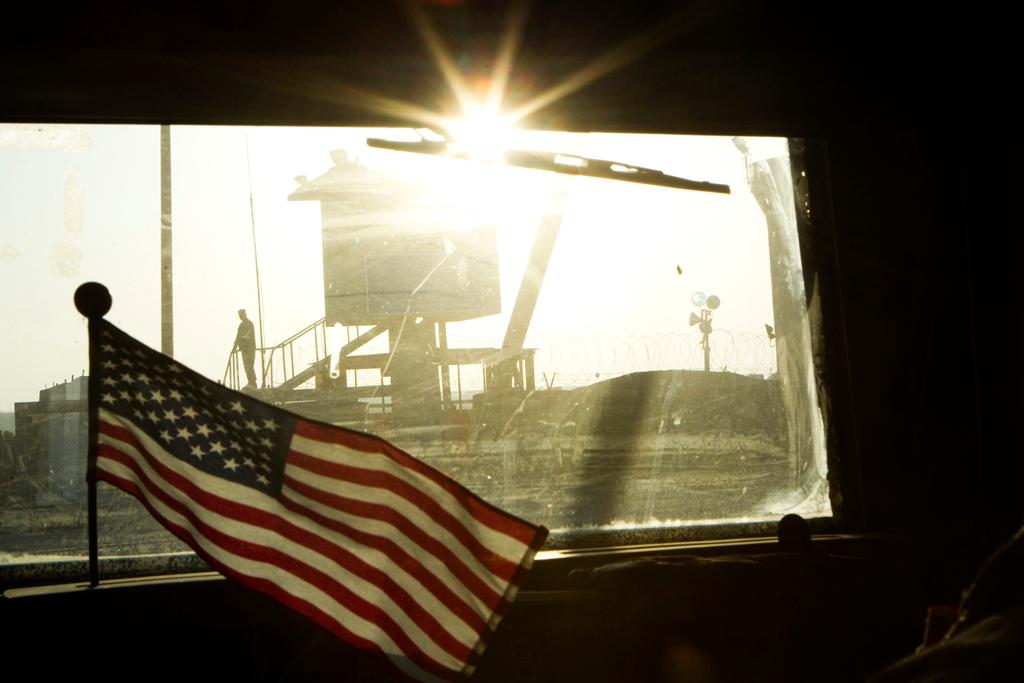No one asked these Iraqis what they thought about US troops coming back
Iraq’s border with Kuwait.
ERBIL, Iraq — It was a moment some thought would never come.
US President Barack Obama ordered American troops back onto Iraqi soil. Granted, it's only a few hundred this time, and they are ostensibly there just to protect the US embassy in Baghdad — a far cry from the thousands that flooded the country after the 2003 invasion.
Still, US troops in Iraq carry the baggage of that long, bloody war, a fact that is not lost on the average Iraqi.
"The situation is bad now, but the US [military] coming back, it will only get worse," said a young man who asked to be called Ibn al-Awja, a nickname meaning "son of al Awja," the town where Saddam Hussein was born. "Honestly, there is no future," he said, exacerbated.
The Iraqi government has officially requested airstrikes from the US as Al Qaeda-inspired militants continue to make gains toward the Iraqi capital a week after sweeping the north.
"They won't be beneficial," Salah Habib, an Iraqi Christian, said of possible airstrikes. "To kill one Al Qaeda you'll kill 10 civilians."
More from GlobalPost: Iraqi deserters say the army's epic collapse wasn't their fault
Habib was forced to flee his home in Mosul last week after the militants came barging in. He left behind the ceramics business he had been growing for the past 10 years.
When it comes to foreign intervention, Habib is torn. He wants the US to help diplomatically, but he doesn't know if that's possible.
"There are too many obstacles and problems, too many misunderstandings," he said. "It's almost impossible for both sides to get back together."
He stuck it out in Mosul through the darkest days of the US-led war in Iraq and the country's ensuing civil war. But now, Habib says it may finally be time to leave the country for good.
"Everybody wants their own side, their own benefit, the Sunnis vote for the Sunni leader, the Shia for the Shia and the Kurds for the Kurds, nobody votes for the nation, for Iraq," he said.
Most Iraqis are as skeptical that the country will hold together as they are that foreign intervention will bring about positive change.
"We're hopeful for [a political solution] to happen," said Mazen, a 27-year-old lawyer from Baghdad. "But I'm sure it's not going to."
Even Iraqi Foreign Minister Hoshyar Zebari, who formally requested the US airstrikes, admitted they won't be enough to right the country. A "drastic political solution" is needed, he said, for a country so deeply divided.
Mazen, a Sunni who asked to be identified only by his first name, was forced to flee his home, but not by Sunni militants in the north. It was Shia militias that pushed him out of the capital.
Prior to fleeing, he noticed more and more Shia militiamen in his neighborhood and heard rumors they were arresting people. Then, two of his friends were taken from out in front of their own home.
"We haven't heard anything about them. I don't believe they're still alive," he said. After that he didn't feel safe going anywhere outside, and said he couldn't just stay at home. So he came to Erbil in Iraq's semi-autonomous Kurdish region. It's safer in Erbil, relatively speaking, which is under the watchful eye of well-trained Kurdish special forces, called the Peshmarga.
After years of sectarian tensions and bloodletting, Mazen says he's exhausted. He hopes to move to Turkey soon.
A Maliki-headed government doesn't have a chance, said Fanar Haddad, a research fellow at the Middle East Institute and author of "Sectarianism in Iraq: Antagonistic Visions of Unity."
"There's just too profound a disconnect between Maliki and the Sunni street for any such attempt to be taken seriously," he said, adding that just getting rid of Maliki wont solve the crisis either.
He views the current upheaval as a rejection of the entire post-2003 order in Iraq, not just the Maliki government.
As tensions began to rise in Baghdad last week, a young woman named Randa and her family fled their home in Monsour district there. They came to Erbil for respite.
Back home, the streets are empty, said the 23-year-old. Families scurry out to shop in the morning and rush straight back home.
"Of course we're worried about the situation, but we just say 'inshallah' all the time," she said, using the Arabic for "God willing." "Everything will be better, inshallah," she said from behind flashy sunglasses, with a nervous giggle.
She thinks the US has an obligation to help Iraq maintain security, but ultimately she says the responsibility lies with her own government.
"I think Iraqis need to solve their own problems, not just rely on the US," she said. "We need Iraqi politicians. This is an Iraqi matter."
